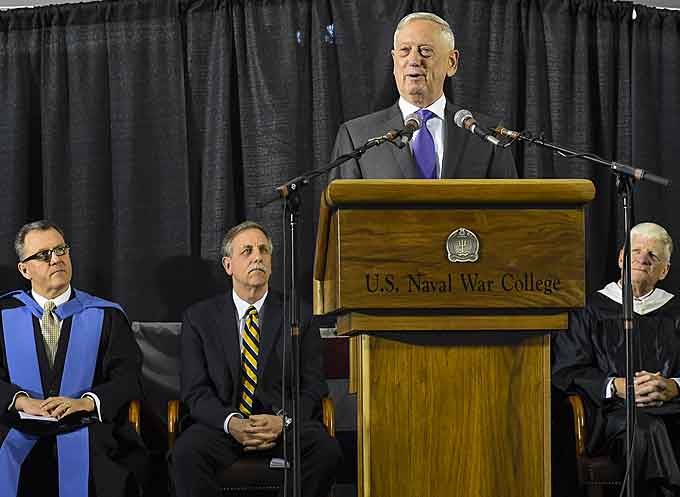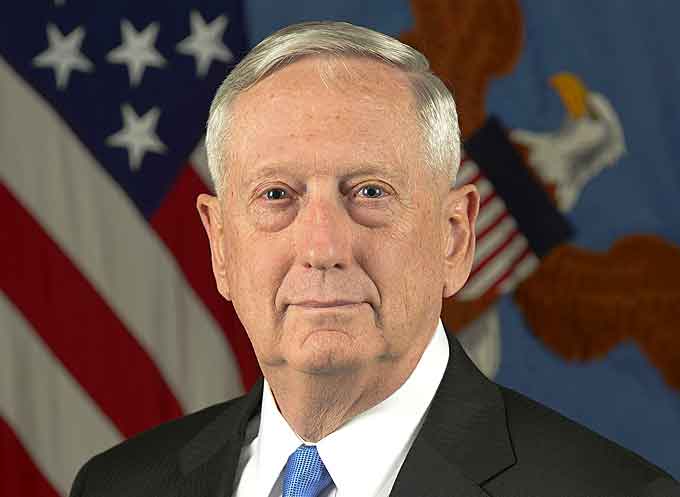
By Terri Moon Cronk, Dept. of Defense
Defense Secretary James N. Mattis told this year’s U.S. Naval War College graduates, June 15, he is confident they’ll carry forward the legacy of the school’s founding officers as they take their intellectual firepower forward to tackle the security challenges of our time.
“[We] are witnessing a world awash in change – a world beset by the reemergence of great power competition, and we define the categories of challenges as urgency, power and political will,” the secretary said at the school’s Newport, Rhode Island, campus.
“We see urgency epitomized by the North Korea situation, as well as by the threat from violent extremist organizations – two very different challenges that have our ongoing attention,” Mattis said.
And, while a possible new avenue to peace exists with North Korea, he said, the United States remains vigilant in pursuing denuclearization anywhere in the world.
Half-a-world away, despite the U.S.-led coalition’s significant success against the Islamic State of Iraq and Syria, extremist organizations continue to sow hatred in the Middle East and murder innocents around the world, from Europe and Africa to South Asia and the Sulu Sea, the secretary said.
(Watch Defense Secretary James Mattis’ address from the 2018 US Naval War College graduation ceremony in Newport, R.I. Courtesy of the US Defense Department, the DoD, the Defense & Aerospace Report and YouTube. Posted on Jun 15, 2018)
Defeating Terrorism
“It is the urgency of this fight that compels us all to act decisively against terrorism, denying terrorists the safe haven they seek and carrying out this counterterrorism campaign, by with and through our allies and partners with over 70 nations united in the defeat-ISIS campaign and 41 nations united under NATO’s flag to defeat terrorism in Afghanistan,” Mattis said.
The United States views Russia as the nation closest to ours in nuclear parity, and it has proven willing to use conventional and irregular power in violation of international norms, the secretary said.
“For the first time since World War II, Russia has been the nation that has redrawn international borders by force of arms in Georgia and Ukraine while pursuing veto authority over neighbors’ diplomatic, economic and security decisions,” Mattis said.
Russian President Vladimir Putin seeks to shatter NATO, and he aims to diminish the appeal of the Western democratic model and undermine America’s moral authority, the secretary said.
“[Putin’s] actions are designed not to challenge our arms at this point, but to undercut and compromise our belief in our ideals,” Mattis said.
Open International Order
There is a potential rivalry with China, as it harbors long-term designs to rewrite the existing global order, Mattis said, adding that after World War II, the U.S. and its allies and partners built the open international order that’s benefited global prosperity.
“It’s unrealistic to believe today that China will not seek to replicate its internal authoritarian model elsewhere as it expands globally,” the secretary said.
In response to those competitive challenges of urgency, power and political will, the Defense Department in January released its first National Defense Strategy in more a decade with three lines of effort, Mattis said.
They are, he said:
-
Building a more lethal military force
-
Strengthening U.S. military alliances and building new partnerships and the reforming and modernizing DoD for greater performance
-
Accountability and affordability to ensure DoD earns the trust of Congress and the American people
The Future
Mattis said he expects the school’s graduates “to be at the top of your game mentally, physically and spiritually, and to work to maintain that standard throughout the rest of your career.”

















